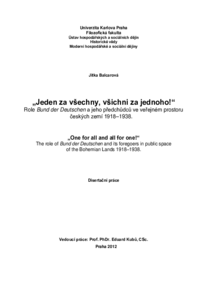"Jeden za všechny, všichni za jednoho!" Role Bund der Deutschen a jeho předchůdců ve veřejném prostoru českých zemí 1918-1938.
"One for all and all for one!" The role of Bund der Deutschen and its foregoers in public space of the Bohemian lands 1918-1938.
dissertation thesis (DEFENDED)

View/Open
Permanent link
http://hdl.handle.net/20.500.11956/42009Identifiers
Study Information System: 101700
Collections
- Kvalifikační práce [23976]
Author
Advisor
Referee
Jindra, Zdeněk
Šouša, Jiří
Faculty / Institute
Faculty of Arts
Discipline
Modern Economic and Social History
Department
Institute of Economic and Social History
Date of defense
25. 9. 2012
Publisher
Univerzita Karlova, Filozofická fakultaLanguage
Czech
Grade
Pass
Předkládaná disertační práce analyzuje německé hospodářské "obranné" spolky zřizované na podporu a rozvoj "hospodářské nacionální državy" v období meziválečného Československa. Jejich institucionální základnou byly tzv. regionální svazy Němců, od roku 1934 Bund der Deutschen. Reprezentují jeden, nicméně z hlediska zkoumaného jevu nejzávažnější typ německých nacionálních "obranných" spolků v českých zemích. Význam těchto spolků tkví v jejich funkci ve veřejném prostoru, kde podporovaly postupnou ideovou a politickou radikalizaci na bázi konfrontačního nacionalismu s antislovanským a antisemitským kontextem. Výzkum odkrývá podstatu jedné z nejdůležitějších organizačních struktur německého nacionálního hnutí, její ideovou platformu, strategie a metody její činnosti. Do popředí vystupuje role spolků jako spolutvůrců nacionální identity. Práce ústí v konstatování, že analyzované spolky velmi významně spoluovlivnily proces formování "sudetoněmecké identity".
The work analyzes the German economic "defense" associations for support and development of the "economic national possession" in phase of the interwar Czechoslovakia. Their institutional representatives were the so-called "regional associations of Germans", since 1934 Bund der Deutschen. They represent one of the most important types of the German national "defense" associations. Their importance inheres in their function in the public space, where they supported a gradual ideological and political radicalization on the basis of the confrontation nationalism with the anti-Slav and anti-Semitic context. The research detects one of the most important organizational structures of the German national movement, its ideological basis, strategies and methods for its function. The role of associations like co-builder of national identity comes forth. The work comes to a conclusion, that the analyzed associations significantly co-influenced a formation process of the "Sudeten German identity".
